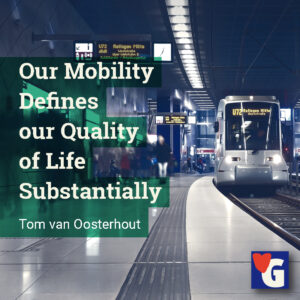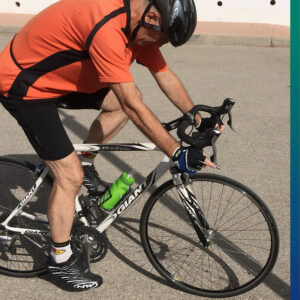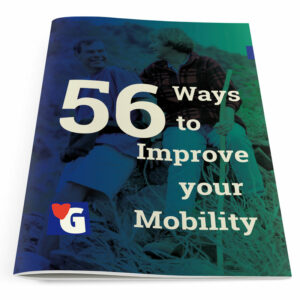
The importance of mobility is demonstrated by the enormous leap in the quality of life of older people took over the last 20 years.
This improvement is predominantly attributed to denser public transport, cheaper cars, scoot mobiles, rollators, improved electric wheelchairs, taxis-to-share and the like.
Our quality of life is defined by our mobility. That sounds a bit odd from someone who spent a substantial part of his life in traffic jams and overcrowded trains. But there is another side of the coin. Another type of mobility that is even more important.
Adequate mobility is critical to a satisfactory old age. Although, satisfactory is not by definition healthy. Our mobility also depends on our physical condition. And a good physical condition is the result of an active life. If you want to stay mobile, stay active. If you want to stay active, stay mobile.
Some of the links might be affiliate links. As an affiliate associate, we earn a small commission when you purchase any of the products offered through the shared links at no extra cost for you. This helps us to maintain this website.
Table of contents
Mobility for a healthy old age

Of course, without sufficient public transport and other mobility facilities, older people would not be able to reach out to family and friends. And the other way around.
Mobility also facilitates older people to work, if they fancy it or still have to. Or to participate in voluntary action. Or to take care of the grandchildren.
And older people want to enjoy the amenities of the big city: cultural provisions, city parks, shops, public health care, social support etc. The city has by far become the core around which all live centres. But without proper mobility facilities, nobody would be able to live there.

The best way to counter any mobility problem is to stay fit

There are plenty of reasons to always use the available mobility facilities with your physical health in mind.
Let me share some tips based on personal experiences:
- Use stairs instead of escalators or elevators. In shops, hotels, subway and train stations, at work.
- Walk up and down the platform of stations if you have to wait.
- If you have to travel short distances, do not sit down in the train and the subway.
- Never use the car or public transport for short distances. Cycle or walk.
- Park your car at the edge of the city and walk or cycle to your destination.
You can read more tips in one of our other articles about personal mobility.
Another reason to stay fit and to walk and cycle and to use public transport is that you reduce polluting emissions. Besides, it’s more relaxing and you see a lot more.

No car, no mobility?

Of course, it’s a moment most of us want to delay as much as possible: to hand in our drivers’ license. Although young people cause the most car accidents, the elderly, 75 and over, are usually number two on the accident list.
It took my father-in-law two months to realize his drivers’ licence had expired. After that, he thought it was no use to try to prolong it. He was never going to pass the tests. Which was the better, because his driving had become awkward.
To handle this emotionally highly disturbing event, it’s best you discuss this issue with your family and friends way ahead of the moment. This implies that you try to estimate when you want to stop driving your car.
The second suggestion is that you do a cognitive test every year from the day you become 75 years of age. Or as soon as you start to distrust yourself on the road.
Related: How Fall-proof Are You? 9 Tips to Prevent Falls
Ask others to help you move around
When you discuss with others your future mobility without a drivers’ licence, try to assess how you can stay mobile without a car. Of course, you should try to stay as fit as possible.
Because you need some stamina to use public transport you need to stay fit. Even without a car, ageing doesn’t mean you stop being active. On the contrary, it’s more important than ever to stay active! Besides, you should always ask others to help you move around. Most people are glad to help out.
Free ebook
If this article inspires you to read more, order our free ebook 56 Ways to Improve your Mobility.

